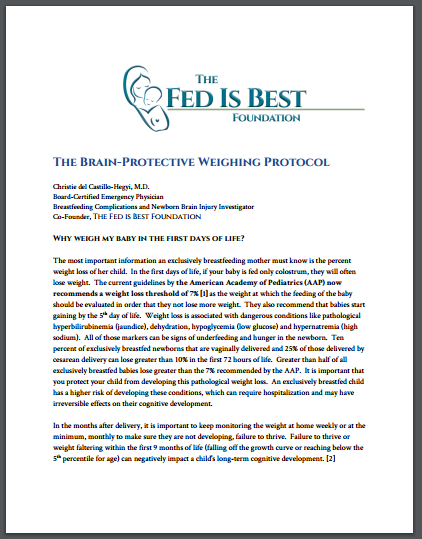Why weigh my baby in the first days of life?
The most important information an exclusively breastfeeding mother must know is the percent weight loss of her child. In the first days of life, if your baby is fed only colostrum, they will often lose weight. The current guidelines by the American Academy of Pediatrics (AAP) now recommend a weight loss threshold of 7%, as the weight at which the baby should be fed should be evaluated to ensure that they do not lose more weight. They also recommend that babies start gaining by the 5th day of life.
Weight loss is associated with dangerous conditions like pathological hyperbilirubinemia (jaundice), dehydration, hypoglycemia (low glucose), and hypernatremia (high sodium). All of those markers can be signs of underfeeding and hunger in the newborn. The stats are clear:
- Ten percent of exclusively breastfed newborns that are vaginally delivered and 25% of those delivered by cesarean delivery can lose greater than 10% in the first 72 hours of life.
- Greater than half of all exclusively breastfed babies lose greater than the 7% recommended by the AAP.
It is important that you protect your child from developing this pathological weight loss. An exclusively breastfed child has a higher risk of developing these conditions, which can require hospitalization and may have irreversible effects on their cognitive development.
Click here to download a printable guide to understanding how to weigh your baby and track their weight during the first days of life and over the duration of their first year.
The complication-Protective Weighing Protocol
Christie del Castillo-Hegyi, M.D.
Board-Certified Emergency Physician
Breastfeeding Complications and Newborn Brain Injury Investigator Co-Founder, The Fed is Best Foundation
Why weigh my baby in the first days of life?
The most important information an exclusively breastfeeding mother must know is the percent weight loss of her child. In the first days of life, if your baby is fed only colostrum, they will often lose weight. The current guidelines by the American Academy of Pediatrics (AAP) now recommend a weight loss threshold of 7%[1] as the weight at which the feeding of the baby should be evaluated so that they do not lose more weight. They also recommend that babies start gaining by the 5th day of life. Weight loss is associated with dangerous conditions like pathological hyperbilirubinemia (jaundice), dehydration, hypoglycemia (low glucose), and hypernatremia (high sodium). All of those markers can be signs of underfeeding and hunger in the newborn. Ten percent of exclusively breastfed newborns that are vaginally delivered and 25% of those delivered by cesarean delivery can lose greater than 10% in the first 72 hours of life. Greater than half of all exclusively breastfed babies lose greater than the 7% recommended by the AAP. It is important that you protect your child from developing this pathological weight loss. An exclusively breastfed child has a higher risk of developing these conditions, which can require hospitalization and may have irreversible effects on their cognitive development.
In the months after delivery, it is important to keep monitoring the weight at home weekly or at the minimum, monthly to make sure they are not developing, failure to thrive. Failure to thrive or weight faltering within the first 9 months of life (falling off the growth curve or reaching below the 5th percentile for age) can negatively impact a child’s long-term cognitive development. [2]
How do I weigh my baby?
Ideally, a baby should be monitored on the same scale, so if it is possible to bring your home scale to the hospital to weigh them at birth, that would be the most accurate way to interpret all the other measurements made by that scale. However, if that is not possible, it is important to know how much your baby weighs regardless. The easiest way to use the scale is to measure your baby in kilograms. 1 kilogram (kg) is 1000 grams. Most home scales measure to 2 decimal places in kilograms.
- To figure out the 7% weight loss threshold, one must take the birth weight in kilograms and multiply it by 0.93 (signifying when the baby has reached 93% of their birth weight or 7% loss). For example: 3.00 kg at birth x 0.93 = 2.79 kg is the 7% weight loss threshold
- Remember to weigh your baby naked or press “zero” or “tare” while your baby blanket is on the scale to remove the weight of the blanket from your measurement. Swaddle your naked baby with this blanket and weigh your baby in kilograms.
- I recommend weighing every 12 hours until a mother’s milk comes in and a successful milk transfer has been established between mother and baby because an exclusively breastfed baby can lose 7% within 24 hours.
- Plot this weight loss using the newborn weight loss tool to give you an idea of their weight loss trajectory and percentile relative to other exclusively breastfed newborns. A child who is already at the 90% percentile or worse on the first day of life may already be in need of supplementation. However, pay attention to the 7% weight loss threshold, which is still the maximum recommended weight loss.https://www.newbornweight.org
What do I do if my child has lost more than 7% of their birth weight?
To figure out what is causing the weight loss, one must troubleshoot where the problem is, starting from the breasts and ending with the child’s weight.
1. Manually express your breast to check for the presence of breast milk. This can be done right after birth by the following method:
http://newborns.stanford.edu/Breastfeeding/HandExpression.html
It is difficult to define what is “enough” breast milk. Ultimately, “enough” for your child is the amount that keeps them satisfied. The weight loss pattern of freely-fed (formula-fed or supplemented) babies shows that vaginally-delivered babies lose an average of 3% and a maximum of 7% total in the first days of life. After that, a baby’s daily milk intake should allow them a daily weight gain of 1 ounce or 30 grams per day. A mother not producing 40-60 mL by the third day every 3 hours may cause an exclusively breastfed child to lose too much weight. Unfortunately, this can happen even before the third day, which is why it is important to weigh your baby in those first days.
Colostrum has 54-60 kcal/100 mL, and mature milk has 66-77 kcal/100mL. [3] A newborn requires 100-110 kcal/kg/day.
A 3 kg baby (6.5 pounds) may need 330 kilocalories or 440 mL of mature breast milk or 14.7 ounces in one day. This is roughly the amount a baby needs to take in to not lose weight.
2. If milk is present and your baby has trouble getting it, you may need help with achieving a good latch. Ask for the help of a lactation consultant or trained nurse. If your child is still not getting milk, they may need assistance with getting milk by feeding of manually expressed or pumped milk with a syringe or supplementary nursing system (SNS).
3. If copious milk production has not started and sufficient milk is not present, supplementation may be required to prevent the complications of underfeeding your baby until milk comes in. If available, this may be done with safe and tested human donor milk or formula. Supplementary feeding may be done with a syringe or an SNS to avoid nipple confusion or bottle preference. However, if the baby has trouble with nursing by this method, bottle-feeding should be initiated with a slow-flow, nursing-friendly bottle. Ensuring the baby receives milk to maintain normal glucose through supplementation if breast milk is insufficient is of utmost importance to prevent long-term cognitive deficits from hypoglycemia and dehydration.
4. Supplementation should be done while burping between each 1⁄2 ounce (15 mL) and be given until the baby is satisfied to prevent overfeeding and regurgitation.
The Bottom Line
Finally, your baby is the only one who knows their tolerance for colostrum-only feeding. A newborn crying incessantly after nursing, not falling asleep for hours (longer than 3 hours), or too sleepy to nurse at least every 3 hours are signs of a child in distress from underfeeding. The link below is a video of a newborn who is very hungry.
A child who is too fatigued from underfeeding will be unable to latch and provide the needed stimulation needed for the mother’s milk to come in. Judicious supplementation can protect your baby from underfeeding and the breast milk supply by giving your baby enough energy to continue nursing. In fact, judicious supplementation after breastfeeding has been shown to double exclusive breastfeeding rates at 3 months.[4] Not only does supplementation of an underfed baby protect that baby’s brain, but it also protects the breastfeeding.
Once the milk has come in, a mother may breastfeed exclusively and monitor her child intermittently for adequate growth weekly to monthly, using the WHO infant growth charts found below.[5]
We believe all babies deserve to be protected from hunger and thirst every single day of their life, and we believe that education on Safe Infant Feeding should be free. If you would like to make a donation to support the Fed is Best Foundation’s mission to teach every parent Safe Infant Feeding, please consider making a one-time or recurring donation to our organization.
References
[1] PEDIATRICS Vol.129 No.3 March1,2012 pg.e827-e841. Breastfeeding and the Use of Human Milk Section on Breastfeeding.
[2] Pediatrics. 2007 Oct;120(4):e1051-8. Weight faltering in infancy and IQ levels at 8 years in the Avon Longitudinal Study of Parents and Children. Emond AM1, Blair PS, Emmett PM, Drewett RF.
[3] BMC Pediatrics 2014, 14:216. Asystematic review and meta-analysis of the nutrient content of preterm and term breast milk. Gidrewicz and Fenton.
[4] Pediatrics June 2013;131:1059–1065,Effect of Early Limited Formula on Duration and Exclusivity of Breastfeeding in At-Risk Infants: An RCT. Valerie J. Flaherman, Janelle Aby, Anthony E. Burgos, Kathryn A. Lee, Michael D. Cabana, Thomas B. Newman
[5] Infant growth charts. WHO and CDC. http://www.cdc.gov/growthcharts/who_charts.htm Last updated July 29, 2016
Disclaimer: This document does not replace in-person physician evaluation and treatment. This document is meant to inform parents of the most recent data regarding infant feeding and to increase their knowledge on how to protect their newborns from hyperbilirubinemia, dehydration, hypernatremia, hypoglycemia and extended or repeat hospitalizations due to complications from underfeeding. Earlier supplementation may be needed for babies who are premature or have medical conditions. It is recommended that a parent seeks evaluation by a pediatrician for any concerns regarding the health and safety of her baby if they arise.
Weight Loss is Not Caused by IV Fluids: The Dangerous Obsession with Exclusivity in Breastfeeding:

